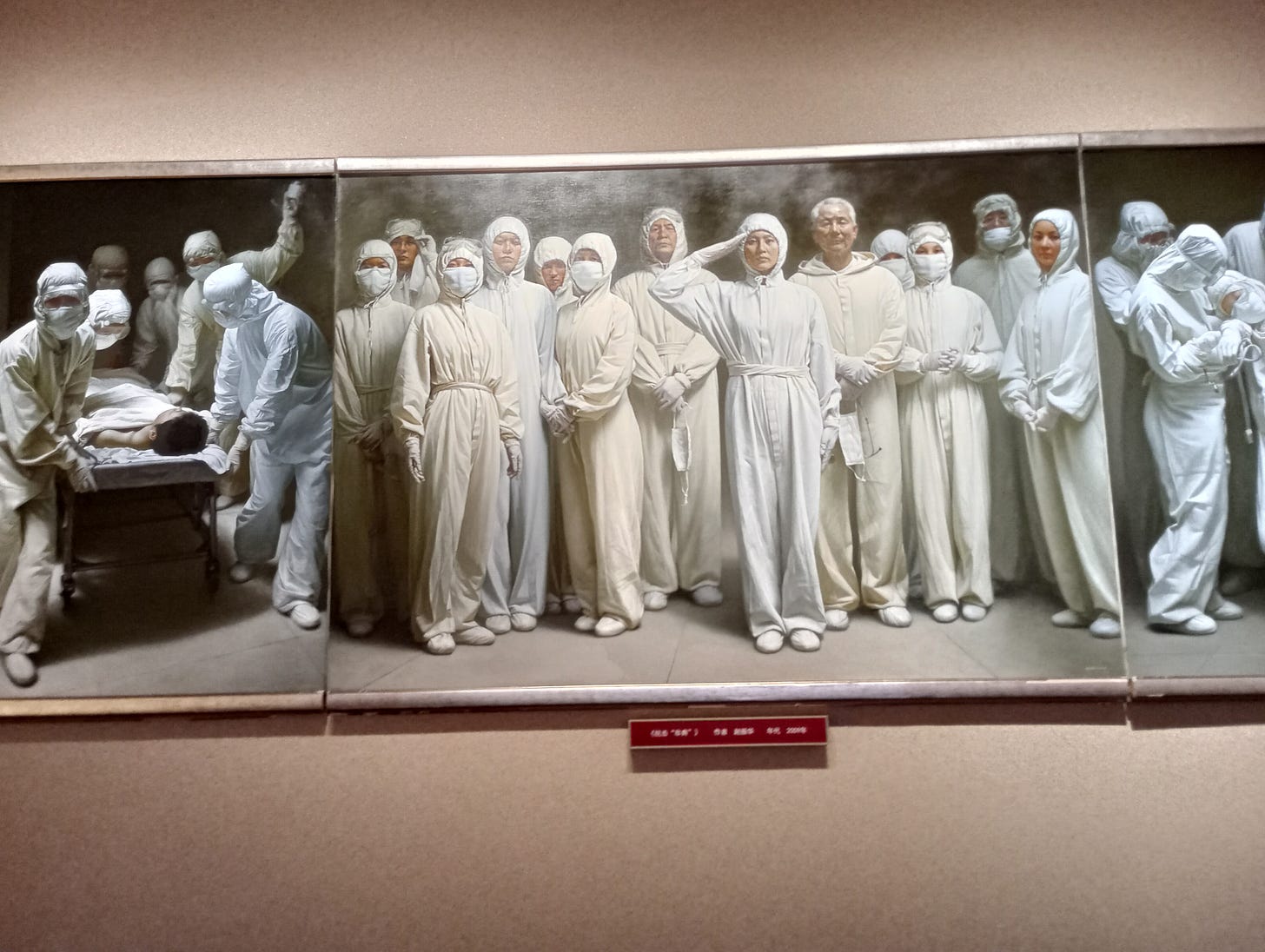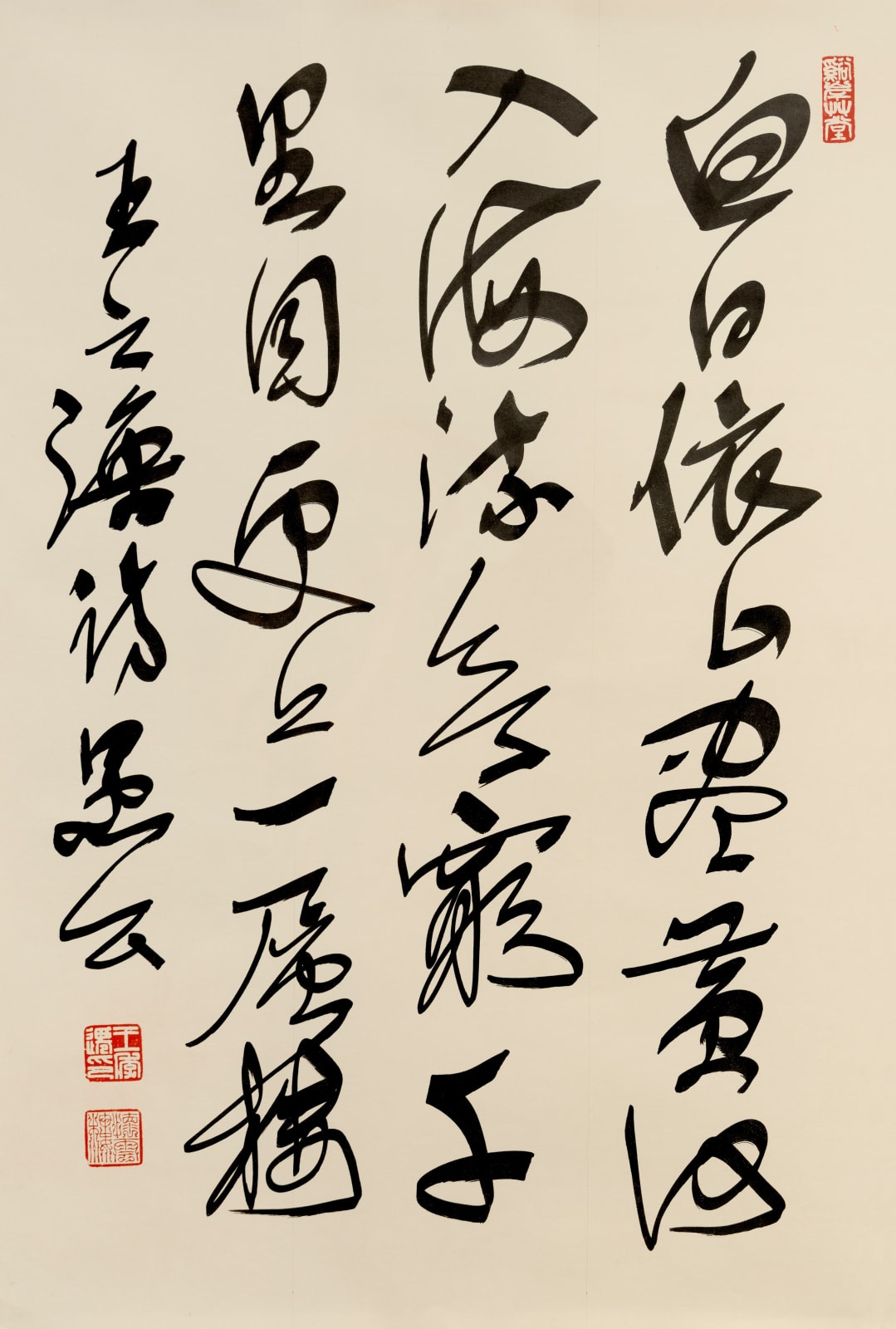About 5 years ago today, during the outset of the pandemic, pictures and videos went around of deserted Chinese streets with trucks spraying disinfectant. For those of us who remember, this was tremendously impressive. Look at how good they were and how crap we were. We banged pots and pans for the NHS and Captain Tom doddered around his garden. They stalked the streets with hordes of “big whites” and rolled out trucks to spray disinfectant. We struggled to keep hospital capacity, treating people in corridors. They built massive temporary hospitals (as you can see in the twee scale model next to the helpfully subtitled propaganda film explaining what a responsible stakeholder China was). Call this China envy.
It is worth dwelling on this a little more. I would chalk China envy up to at least three things. Firstly, disgust with the present system and a profound declinism. Second, enlightened technocracy and systems thinking as the official ideology of the emerging British counter-elite. Third, overcorrection on prior, mistaken, beliefs.
Start with declinism. The flip side of groups like UkDayOne, LFG, or Civic Future gathering momentum is the palpable sense that the system which brought Britain here isn’t fit for purpose. Britain is in managed decline, and the litany is familiar. The British state spasms madly in absurd and hilarious ways. A 120 million pound ‘bat tunnel’ holds up our high speed rail project. A road is approved after 16 years of planning at a cost greater than it took Norway to build the longest underwater tunnel in the world. An Albanian criminal isn’t being deported because his son didn’t like the chicken nuggets elsewhere. 15 years of no growth. Failures in provision of basic services which cause most people to greet the suggestion of going to the NHS for anything less serious than Ebola with a derisory chuckle. And so on. If the system is broken, why not try something else? And why not try the thing which all indications say work? It is the justification of every autocracy in history - “there was no other way.”
It’s a natural pattern. If you’re looking to improve things, why not look to other examples of things which have improved? Moreover, if you’re an elite, you’re more likely to look to systems which have delivered outcomes for other elites. The Chinese system is consensual in ways which benefit elites more than non-elites, and its benefits are delivered extremely unequally. That helps explain why we don’t see much Poland envy or France envy. Those countries are much more similar to us and have done better across much more relevant metrics. But their reforms are a lot less elite-coded.
Secondly, enlightened technocracy is rapidly becoming the official position of the emerging British counter-elite. It’s not fair to write off the position of the LFG-ers or the Dominic Cummings acolytes as “smash the system and put people like me in charge.” But that description isn’t totally wide of the mark either.
I would suggest that one reason why China appeals is precisely because of its unabashed technocracy. The Leninist ideology of the CPC implicitly casts the Party as the vanguard of the Chinese nation, the CPC’s leadership indispensable to China’s national identity and its great rejuvenation. The roots of this technocratic urge go deep in Britain as well. It’s common to describe the British theory of government as “good chap” government. As long as fundamentally good chaps are in charge then things will be basically alright. Our problem, on one view, is that there are no longer any good chaps or competent chaps.
But, as the priests of technocracy will tell you, what’s going on in Britain is a systems failure and not merely a people failure. The quangocracy has usurped the levers of power which leads to unsightly spectacles such as the (elected) Minister for Justice being completely unable to adjust sentencing guidelines set by the (unelected) Sentencing Council. So the technocratic urge isn’t just the “throw the bastards out” China envy you might get from declinists. Instead, technocrats will advocate for centralising power around a core of competent people and then ramming through necessary changes. The words “centralism” and “core” should sound familiar to any halfway-practiced China student.
Thirdly, I think there has been an overcorrection in attitudes toward China. The most visible example of this was the migration toward Xiaohongshu following the brief banning of TikTok in the United States. Initially, young Americans downloaded Xiaohongshu as an ironic middle finger to their government which had told them that Chinese control of their social was something they should be concerned about. But we rapidly began to see extreme cringe from the most left-leaning, where you’d see young Americans in poor Mandarin lavish praise on the Chinese Communist Party. This is a reflection of the cocktail of extreme self-hatred and narcissism which has metastasized throughout the American body politic. Particularly among the young. But it’s ultimately harmless. A few communists ironically praising Xi is nothing to be worried about.
What is more disturbing is the people breaking down sobbing on contact with Chinese propaganda narratives about how great it is in China. One reason she might be upset is that she’s been whipsawed from “China is a far-off nightmare hellscape peopled by raging communists who eat children” to “China is a far-off utopian paradise peopled by wise and inscrutable saints who see it as their mission to heal the world.” Both are wrong, of course. I’ve no doubt things are hard for some people in America. And a lot of people in China do live pretty good lives now. But this reversal isn’t close to the facts. It may even be further than where she was before.1
This whipsaw is a smaller-scale version of a wider social whipsaw undergirding the Western crisis of confidence. It was common to view our system as the best possible one. I still think that’s true. But one corollary of that view ended up being that our institutions were all the best possible ones. That’s proven to be untrue. Witness Blairite institutions constantly doing mad things with apparently no ability for the government to do anything about it. Elites have found themselves plummeting from the belief that our system was perfect and it could do no wrong to the belief that it is totally broken and has to be tossed out wholesale. Both positions were wrong, but the overcorrection is profoundly damaging.2
The parts of the Chinese system which someone chooses to seize on and be envious of, and the parts which someone chooses to overlook, track perfectly with their greater way of seeing the world. If you’re a declinist, it’s natural to latch onto a national myth of renewal. If you’re a systems thinker, you want to wreck the system and go for broke on centralism. If you were misinformed then the easy impulse is to overcorrect.
The antidote to China envy isn’t China fear. It’s China understanding. There has to be a way to get past ignorance, past the Dunning-Kruger effect, past reactionary overcorrection, and to something approaching truth.
Here, too, there are pitfalls. One temptation is to view China as a “dark mirror” of reformist impulses like the ones I’ve sketched. Declinist narratives of renewal are mirrored darkly by the increasingly muscular project of Chinese renewal which swallowed Xinjiang and Tibet, cracked down in Hong Kong, menaces Taiwan, sets its eyes throughout its near abroad, and even contemplates dominance throughout the world. Systems thinkers come a cropper when confronted by Xi-esque authoritarians who will happily take control of the strong and centralised systems they build and wreck shop. Overcorrectors’s distrust of their own governments and societies leads them to fall for the propaganda of a country with deep and systemic problems of its own.
This “dark mirror” view is a mere temptation with grains of truth, not true analysis. China is not a mirror for anything - it is a complicated, real place with complicated, real politics. We do our project of understanding a disservice if China is merely the arena for our own ideas to fight it out. And turning China into a mirror obscures the truth.
For all the initial bumbling and subsequent failures, Britain came out the other side of COVID. But in China, the “big whites” went from angels to welding Chinese citizens into their apartments and letting them starve. The economy suffered under Zero Covid. Increasing unhappiness required increasingly brutal crackdowns. Bragging about how the Chinese system was fit for crises instantly turned to ashes in the mouth of the Party. The threat of widespread social disorder forced the government to lift the lockdowns, and promptly saw a rebounding case rate. COVID posed a challenge to every system in the world. It’s fair to say almost every society failed it, including China. And, crucially, the way China failed the test is a reflection of its particular pathologies, just as the way we failed it is a reflection of ours.
Declinists in general trip up on China envy all the time. Nick Land sees modernity as hopelessly broken, with the only reasonable approach left being to accelerate toward a technological future. He famously saw “neo-China arriving from the future” and he lives in Shanghai. Curtis Yarvin praised China as a partial manifestation of the enlightened autocracy he advocates for, and ended up saying a bunch of things which look stupid right now.
Systems thinkers do need to bear in mind the authoritarian risks they create with centralism, but China is a poor place to be envious of because its cadres are constantly purged for corruption and disloyalty. It is a place to learn from where it succeeds and avoided where it fails, nothing else.
And overcorrectors should bear in mind that the certainty into which they have stumbled is just as shaky as their prior certainty. Anyone who writes about China will have encountered the older white guy (they are always men) who believes himself to be a true expert who truly sees China as it is. This isn’t helped by the fact that he will often be trotted out by Chinese state media as their “old friend of the Chinese people” of choice, further inflating his ego. Sadly, they often end up being even more misinformed, with many enthusiastically spouting propaganda narratives not even believed within the country, in its think tanks. I’m not going to name any names but any China student will know the people I’m thinking of.
How to get to truth?
The well is deeply poisoned. China has become a more closed-off country, no longer the country where true experts like Rana Mitter, Orville Schell, or Rush Doshi could delve into the archives. Xi’s rule has begun to demand a greater degree of ideological uniformity, and reformist sentiments have been forced underground or snuffed out. Since the fall of Hong Kong, there is no longer an easy conduit to access dissident opinion.
Worse, entrepots have become less representative and not more. Xiaohongshu is a particularly bad example. Many Americans’ first exposure to authentically Chinese social media was a platform mainly used by middle-class women, in Tier 1 or 2 cities, or studying abroad. This is a bit like trying to understand Britain by going on a neighborhood WhatsApp group in Notting Hill.
The CPC is well aware of the need to control the information environment and tell the China story well. In open societies, we see every wrinkle and failure. We’re used to loudly denouncing our government. But the CPC will tell you that the media is a tool of the Party, not in opposition to it. In a very real way, the flaws and truth of China is becoming whitewashed. This is a tragedy. China is a fascinating place worthy of deep study, and the thin gruel offered by the Party is a disservice.
I do not believe that our societies as constituted have a good answer to a systematic regime of information control. Our system works on the basis of free and open discussion. Trying to enforce one opinion or another is bound to end in failure. Sensible steps like building British capabilities for understanding are a good place to start. But they are only a start. Perhaps it is simply too great a project to try to spread understanding of something very complicated with a great deal of nuance.
I disagree. I think that British citizens are a well-meaning lot capable of understanding complicated concepts. The task of experts (which I don't consider myself) is to present them with the truth, not to try to persuade them of anything. We ought to air the full range of dissent and argument in China. And then let people make up their own minds. That is the enduring strength of open societies. I think there have been a number of good books which contribute to that project, including Bullets and Opium by Yiwu Liao, Should The World Fear China? by Zhou Bo, Red Memories by Tania Brannigan, Emily Feng’s Let Only Red Flowers Bloom, Keyu Jin’s New China Playbook, The Rise And Fall of The East by Yasheng Huang, Sparks by Ian Johnson, and most notably Private Revolutions by Yuan Yang MP.
China envy results from lazily trying to understand a big country by putting it in the small box of your worldview. The only hope for the truth is trying to see the whole elephant. It is a difficult and lifelong project. But isn’t everything else?
Amusing side note: the article I found the link in starts with “First of all, I’ve never been to China. I have no idea what it’s like, or if the things we see online are actually true. I don’t know how the average person lives in China.” Lol.







Its unfortunately not well known here in America, but China, at least from the 1980s until recent years (Xi et al. are have been trying hard to change this), has been much less of a technocracy than we are these day, in fact its decision making has had deeply populist features, in fact, in some key ways it has been closer to the American Old Republic than contemporary America is. Its had very strong local governments with moderate local trade protectionism and forms of moderate local capital flow inhibitors. Local governments are strong and engaged in a wide range of policy areas that America decades ago made almost the sole purview of our national center. And the local parties' membership is often around 10% of the local population and reflects a fairly broad amount of the local population spectrum, many dont have degrees and many of those that do have what people here would likely dismiss as "trade certificates". And while it can be exaggerated, and it varies place to place in how much its there, the CPC does actually have intraparty democracy.
In fact, China has been the most economically and politically decentralized country in the world.
The USA used to be even more populist. The United States once had genuinely democratic governance structures, however imperfect and limited, fundamentally based around decentralized and publicly accessible mass-member parties. The Democratic Party, as a small "d" democratic institution, and the Republican Party, as a small "r" republican institution, were honest in their naming and functioned within a politically, economically, governmentally, financially, and scientifically decentralized system. These parties, while far from flawless, allowed for real representation, meaningful participation, and a level of public accountability in both economic and political decision-making.
However, due to the dirty deeds of an assortment of powerful special interest groups, our parties have transformed into centralized, exclusionary membership organizations. The so called Democratic Party has become a technocracy party, and the so called Republican Party became a conservative party. Neither really represents their original principles of democracy or republicanism, and they dont offer meaningful access or representation to the public. This shift has been accompanied by a broader centralization of political, economic, and scientific decision making, which has caused the effective loss of most democratic governance structures.